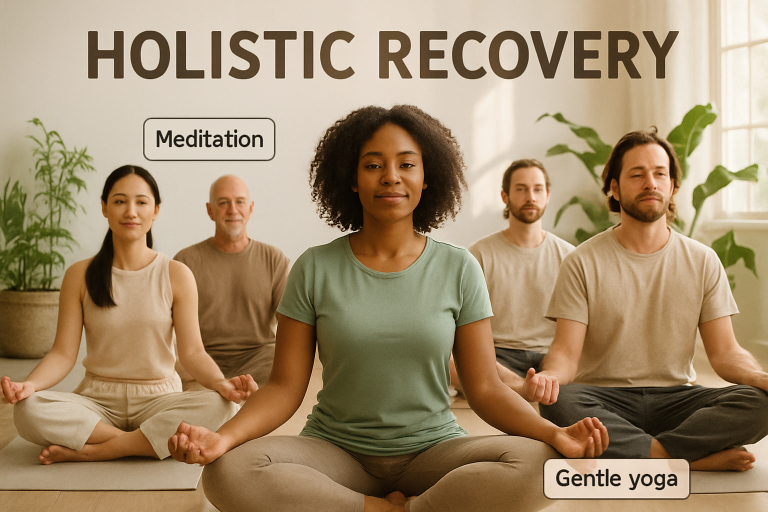Table of Contents
- Mindfulness and Meditation
- Physical Fitness and Nutrition
- Art and Music Therapy
- Community and Peer Support
- Spirituality in Recovery
- Nature and Outdoor Therapy
- Integrating Holistic Approaches
- Embracing Wholeness in Recovery
Addressing substance abuse requires more than just breaking physical dependence—it involves healing the mind, body, and spirit. Traditional methods often focus primarily on symptom management, but long-term recovery depends on understanding the deeper causes of addiction, such as emotional trauma, stress, or lack of purpose. By adopting a well-rounded approach, individuals can cultivate resilience and regain balance in all aspects of their lives.
For many, recovery becomes more effective when supported by programs that blend medical, psychological, and holistic practices. Facilities offering addiction treatment Yorktown Heights NY, often integrate therapies such as mindfulness, yoga, nutrition counseling, and group support to promote overall wellness. This comprehensive approach not only addresses addiction itself but also nurtures personal growth, self-awareness, and sustainable healing for a fulfilling, substance-free future.
Mindfulness and Meditation
Mindfulness-based practices are increasingly promoted in addiction recovery because of their effectiveness in helping individuals stay present, accept difficult emotions, and cope with stress without relying on substances. Techniques such as mindfulness meditation, deep breathing, and guided relaxation facilitate emotional regulation, create healthy neural patterns, and foster a grounded sense of self. Programs centered on mindfulness have shown promise in reducing relapse rates for those in recovery, making them valuable additions to both self-directed and structured treatment plans.
Many modern facilities such as a Beverly Hills rehab center, incorporate mindfulness as a core element of their holistic recovery approach, combining evidence-based therapies with practices that nurture inner peace and long-term resilience.

Physical Fitness and Nutrition
Restoring physical health is essential for a complete recovery. Activities like running, swimming, yoga, or tai chi can aid in healing from substance dependence and boost mood through the release of endorphins. They control cravings and stress, while balanced nutrition addresses deficiencies from long-term abuse, strengthening resilience. Incorporating fitness and nutrition expedites healing and fosters lasting self-care habits.
Art and Music Therapy
Art and music therapy offer vital emotional outlets for those in recovery, allowing creative, nonverbal ways to process trauma and feelings. Participants use artistic expressions to share difficult experiences in a supportive environment, which activates brain regions, lowers anxiety, and fosters a sense of achievement. These therapies are often included in comprehensive addiction treatment programs.
Community and Peer Support
Recovery is rarely a solo journey. Participating in a supportive community—whether it’s group therapy, 12-step meetings, or peer-led programs like SMART Recovery—gives individuals access to collective wisdom, shared accountability, and ongoing encouragement. Peer support systems can enhance motivation, reduce feelings of isolation, and build practical skills for navigating life after addiction. Involvement in recovery communities is associated with a heightened sense of belonging and lower rates of relapse, making it a critical component for long-term success.
Spirituality in Recovery
Spirituality in recovery involves connecting to something greater than oneself, not necessarily a religious concept. Practices such as prayer, meditation, or reflection help individuals find meaning and strength. Studies show spiritually fulfilled individuals are more resilient to relapse and happier. Holistic programs integrate spirituality with clinical care to provide comprehensive recovery.
Nature and Outdoor Therapy
Nature and outdoor therapy are essential components of holistic recovery programs, promoting lower stress, improved mood, and enhanced well-being. Activities such as hiking and gardening provide helpful breaks from daily stressors and support physical well-being. Many recovery centers incorporate outdoor activities and wilderness therapy into their treatments, acknowledging the healing power of nature.
Integrating Holistic Approaches
Combining various holistic methods creates a personalized recovery experience through adaptable programs that balance medical care, therapeutic support, mindfulness, community involvement, and spiritual growth. This approach considers the mind, body, and spirit as interconnected, providing a strong foundation for sustainable recovery and lifelong health. With the help of counselors and peers, individuals are encouraged to discover their best path to recovery.
Embracing Wholeness in Recovery
Healing from substance abuse is an ongoing process that thrives on balance, connection, and self-discovery. By embracing holistic methods that nurture the body, mind, and spirit, individuals can move beyond mere sobriety toward genuine transformation. The integration of mindfulness, physical wellness, creative expression, and spiritual growth paves the way for lasting recovery and a renewed sense of purpose in life.









